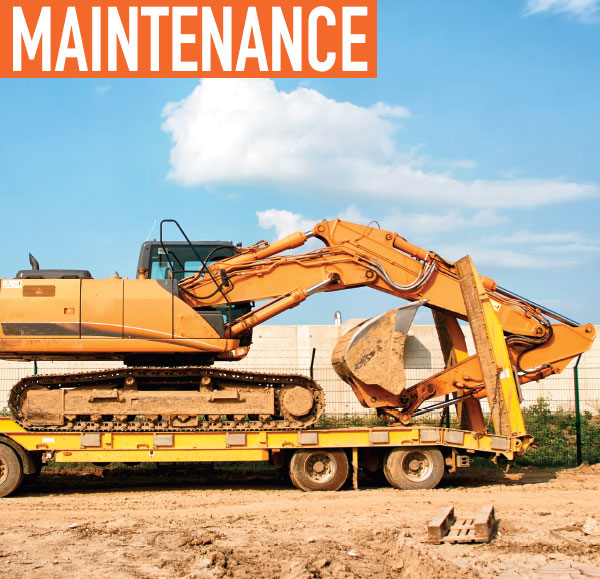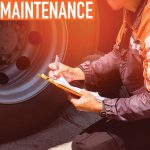Trailers tend to receive the short end of the stick when it comes to truck maintenance, but ensuring all vehicle components work properly is essential to the safety, performance, and bottom line of any fleet.
Thorough scheduled preventive maintenance checks and inspections can help your fleet increase uptime, ensure safety, and reduce violations. Although trailers aren’t nearly as complex as powered vehicles, there are still key components that require regular care.
KEEP ROLLING
Tires are one of the most overlooked aspects of trailer maintenance and are typically the number one reason trailers are put out of service or require roadside service. As the top trailer maintenance cost, tires should be a fundamental concern for any fleet manager.
Because trailers often sit idle parked on yards awaiting their next load and driver, they don’t always get the proper care they need, such as visual inspections for damage and tire pressure checks. To add insult to injury, trailer tires operating in extreme off-highway applications are more susceptible to wear and tear due to rough terrain and extreme environmental conditions. Before you think about maintenance, it’s important to make sure your trailer tires are designed to handle the stresses of your fleet’s particular work environment.
Stone drilling, for example, is a frequent cause of tire damage and occurs when stones get trapped in the tread base of a tire, extending through to the belts and damaging the casing. Not only can this lead to an on-road failure, unexpected downtime, and delays, it can prevent your fleet from retreading those casings later on.
Choosing the right trailer tires for your fleet, like a cut-resistant compound in an environment or application where loose stones are present, coupled with routine maintenance and inspections can help increase productivity and avoid nonessential downtime.
INSPECT TO PROTECT
Regardless of vocation and application, however, it’s important to perform daily tire checks, paying attention to tire pressure, tread depth, and the overall condition of the tire. Tires should be inspected during pre- and post-trip inspections for cuts, abrasions, tears, and any unusual wear.
Underinflation is the number one cause of tire failures. This combined with idle trailers whose tire pressure has gone unchecked for long periods of time is a recipe for an on-road tire failure. If your fleet’s trailers are not equipped with Tire Pressure Monitoring Systems (TPMS), consider installing them to save time and money. TPMS technology makes detecting low tire pressure much easier for drivers, as it notifies them when tire pressure is low, right down to which tire is causing trouble, its temperature, and leak rate.
BRAKE CHECK
In addition to tires, make sure your scheduled preventive maintenance checks (PMs) include a thorough inspection of braking systems, as this part of the vehicle often leads to trailer delays and out-of-service notifications at roadside inspections. Brake system abnormalities are cited so frequently that the Commercial Vehicle Safety Alliance (CVSA) devotes an entire week to roadside brake inspections through their annual Brake Safety Week event.
As costly and inconvenient as tire failures can be, a brake system issue is equally as inconvenient, not to mention it will impact your CSA score.
While there are key components across all trailers that require regular inspections, specialized equipment may need additional checks, as there is no one practice that fit all. Fleets with shorter duty cycles carrying lighter loads may have hot shot style trailers equipped with hydraulic brakes, whereas fleets hauling heavier loads may opt to use larger flatbed trailers equipped with air brake systems.

Service procedures for each kind of brake system differ dramatically, so it’s important to find a trusted service provider that is equipped to handle the maintenance and inspections of your fleet.
Scheduled preventive maintenance checks should include the inspection and correction of brake adjustment (either manually or with automatic slacks), air hoses and tubing (with the brakes applied), all hardware to ensure it’s secure and properly in place, brake lining and drum thickness, as well as confirm no air leaks are present.
If your vehicles are equipped with automatic slack adjusters as most are today, remember that automatic does not mean maintenance-free. Proper lubrication of slack adjusters during PMs and brake cams help keep the mechanical part of the brake system functioning properly. A lack of lubrication of s-cams, for example, can cause the brake shoes to wear unevenly, leading to costly repairs down the road.
IN THE DETAILS
Other components that should be inspected regularly and during scheduled PMs include lights and electrical systems. Perform a full electrical check at least once a year on the battery, alternator, cables, and connections. Check for any damaged lenses and ensure all wiring has strong connections. Loose connections and corrosion are common reasons lights need repair, both of which are preventable with proper maintenance and care.
Lastly, lubricate the fifth wheel and inspect this area for corrosion, keeping an eye out for any loose or missing bolts and unusual wear. Check the kingpin for tightness, as this component is responsible for carrying the entire load of the trailer and is often overlooked.
No matter the size or application of your fleet, scheduled preventive maintenance inspections and frequent visual checks of these components can help avoid downtime and delays and instead drive your productivity.
ABOUT THE AUTHOR
Homer Hogg is the director of TA Truck Service Technical Service. He holds an ASE Medium/Heavy Duty Truck Master certification, is a Daimler Trucks North America Dealer Trainer, and is a co-host on SiriusXM’s “Maintenance Matters.” Find out more, visit www.ta-petro.com.
MODERN WORKTRUCK SOLUTIONS:
OCTOBER 2019 ISSUE
Did you enjoy this article?
Subscribe to the FREE Digital Edition of Modern WorkTruck Solutions magazine.





